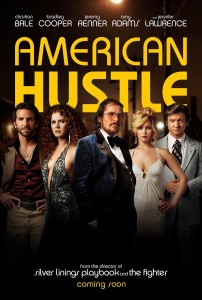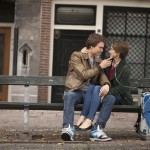As Irving Rosenfeld, the consummate con-man of American Hustle explains, people want to be conned. That’s because, broadly speaking, there are two types of personal change. There is real change, involving an internal change of disposition, and there is superficial change, involving an external change of circumstances. The former is difficult— so, unsurprisingly, we tend to be attracted to the latter. It is this desire for quick and easy transformation that the con-man feeds on. We want to believe that our problems can just disappear.
In a pivotal scene in American Hustle, Rosenfeld and Richie DiMaso, an FBI agent, are staring at a painting in a museum. Irving tells DiMaso it’s a forgery. People want to see it as the real thing, so they do. Irving then makes his grand point: who is more impressive? The Painter, who makes a great work of art, or the Forger, who can ape it so well that no one can tell the difference?
Every major character in American Hustle is a Forger. They are each engaged in a process of self-invention, of external change through deception. Rosenfeld and his girlfriend Sydney Prosser— played by Christian Bale and Amy Adams, respectively—have carved out an upper-class lifestyle by posing as wealthy and connected moneylenders and laundering the scammed funds through Irving’s dry-cleaning businesses. Richie DiMaso, played by Bradley Cooper, is trying to leap up the FBI ranks by inflating one routine sting into a giant scheme to take down half of Congress and the entire Eastern Mafia. The manipulative (and somewhat psychotic), Rosalyn Rosenfeld, played by Jennifer Lawrence, hides from her own faults by any means necessary, up to cheating on Irving with a Mafioso. Even Carmine Polito, played by Jeremy Renner as easily the most sympathetic character in the film, is trying to resurrect the New Jersey economy with bribes, graft, and casinos instead of actual transformation.
The story that ties all these Forgers together is a convoluted one. Irving and Sydney fall in love, scam people, get caught, and are blackmailed by DiMaso into helping the FBI make a big corruption case against New Jersey politicians.
There are side-cons throughout, each entertaining to various degrees. The main con includes (but is not limited to) a fake Sheik donating large amounts of bribe money to various politicians in order to set up gambling businesses in Atlantic City. Of course, to set up casinos anywhere you need the Mob—which means Robert De Niro, in a hilarious cameo— and to prove to everyone your story is true, you need millions and millions of dollars—which the FBI doesn’t have just lying around.
Working with such an over-the-top story, the cast deserve credit for making it feel so plausible. This aura of believability owes something to the opening title card—“Some of This Actually Happened”—but more importantly, the story is believable because we know that the promise of painless change can provoke people to take absurd risks. The promise of the con is always change without pain; all of your circumstances will improve, with little or nothing required of you. For such change, people will believe, and do, practically anything.
Of course, for each of these characters, the “big lie” unravels. Irving and Sydney get conned by DiMaso, DiMaso’s bloated sting operation cannot possibly succeed, and even Rosalyn is running up against the limits of her own solipsism. This is where American Hustle’s great honesty can be admired. Each of these characters is striving to change everything in the world, except themselves, thereby leaving them at the mercy of unyielding reality. Moving from one city to another, switching husbands, changing jobs, finding a different way of life, starting new casinos—the characters are constantly cycling through every possible combination of friend-group, appearance, costume, and lifestyle. None of them ever attempt to focus the inquiry interiorly— What do I need to change? What does a change in circumstance accomplish if I remain essentially the same?
All of this could add up to a convincing morality tale if the film let it: our desire for painless self-invention eventually results in broken promises, hollow outcomes, and no real change outside of a fake accent. Alas, the final message of the film seems to be not so much that we should aim for Truth, but that Forgery is all the world has to offer. Irving and Sydney ultimately “win,” the buffoonish DiMaso “loses,” and the only real difference in how each character is situated appears to be that some of them are cool enough to deserve our rooting interest and some are not. As an example, consider perhaps the only self-possessed man in the entire movie, an FBI supervisor named Ruben Stoddard, played by Louis C.K. He repeatedly attempts to talk DiMaso down from his convoluted schemes, but instead of being rewarded for his caution and good sense, Stoddard is unceremoniously beaten with a telephone. It would be a stretch to pretend the movie shed any tears for him. And why would you? He’s a boring, middle-aged, overweight, bald guy. This is not cool.
As the great John Henry Newman once said, “To live is to change, and to be perfect is to have changed often.” We can try to convince ourselves that we change with our circumstances: that by moving to a new city, buying a new car, getting a new friend, boyfriend, or spouse, watching new shows, or wearing new fashions, we are made anew. American Hustle entertainingly reveals the ultimate meaninglessness of these circumstantial “changes” in our lives. We spin through the carousel and end off no better than we started. Unfortunately, that appears to be all the insight that American Hustle has to offer. The painful, tedious, honest work of self-improvement is nowhere to be found, for not one of American Hustle’s host of con-men ever even give it a try.
















